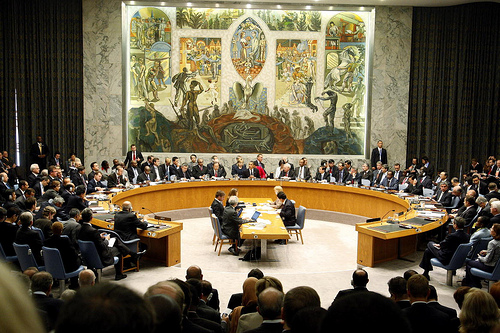In part I of this series, the history of the adoption, and subsequent implementation, of resolution 1325 on Women, Peace and Security (WPS) in the United Nations Security Council (UNSC) was examined. Referring to a brief released by the NGO Working Group (NGOWG) on the execution of the WPS agenda within the UNSC, titled Mapping Women, Peace and Security in the UN Security Council (MWPS), the article examined the barriers standing in the way of fully integrating women into the inner-workings of the UNSC with regards to pre and post-conflict settings, as well as conflict prevention and resolution. In this sequel, solutions suggested by MWPS, as well as examples of successful integration of the WPS agenda into organizations such as NATO will be examined.
Given the findings of the brief, and the clear lack of understanding and commitment towards achieving the goals designated 15 years ago in resolution 1325, MWPS makes a few recommendations to “the UN system, the Security Council and all Member States….in order to meet their obligations”. First, it proposes a “high-level political leadership in the UN system,” with sufficient human and financial resources to ensure the implementation of all aspects of the WPS agenda. Second, it recommends a “follow-up process,” whereby frequent and regular reviews are undertaken, specifically for the “core peace and security elements of the agenda”, and improved streams of information are established to guarantee transparency and accountability. Third, the brief emphasizes the significance of the WPS agenda not only within the UNSC, but throughout the UN system and other international actors such as NATO and the World Bank. To that end, it recommends such actors undertake “capacity training and funding” to regulate and endorse the broad integration of women in all phases of conflict settings.
Additionally, the brief suggests including explicit analyses on women’s security concerns in briefings from senior UN officials, producing critical reports that “reflect the reality of women’s rights and the full scope of the WPS agenda,” as opposed to broad information and activity briefings. It also proposes cooperating with local women’s civil society organizations on a regular and more frequent basis, and “fully integrating WPS in (UNSC field missions’) Terms of Reference” by meeting women who have been directly influenced by the conflict or crisis at hand.
“empowering women in all aspects of the community is an imperative step towards the achievement of a thriving future that is free of ignorance, prejudice and violence.”
NATO has taken many steps towards integrating resolution 1325 into every level of its operations. Developed in tandem with the Euro-Atlantic Partnership Council (EAPC) in 2007, NATO’s policy on implementing resolution 1325 depends on adopting policy frameworks and working  mechanisms. The establishment of the NATO Secretary General’s Special Representative on Women, Peace and Security in 2012 as a permanent position is one of many significant strides taken by NATO to further the causes of resolution 1325 in its structure. In addition, NATO has worked towards removing barriers that prevent the active involvement of women in NATO’s defence and security institutions. It has also worked with its allies and partners to integrate gender perspective into policies regarding preventing and resolving conflict. Crucially, as emphasized by MWPS, NATO has involved local civil societies (specifically women’s organizations) and stressed including a gender perspective in its conflict analysis and the mission planning. Furthermore, NATO has emphasized the importance of improving gender balance within deployed personnel, as well as the need to “provide direction” on how to react to sexual and gender-based violence.
mechanisms. The establishment of the NATO Secretary General’s Special Representative on Women, Peace and Security in 2012 as a permanent position is one of many significant strides taken by NATO to further the causes of resolution 1325 in its structure. In addition, NATO has worked towards removing barriers that prevent the active involvement of women in NATO’s defence and security institutions. It has also worked with its allies and partners to integrate gender perspective into policies regarding preventing and resolving conflict. Crucially, as emphasized by MWPS, NATO has involved local civil societies (specifically women’s organizations) and stressed including a gender perspective in its conflict analysis and the mission planning. Furthermore, NATO has emphasized the importance of improving gender balance within deployed personnel, as well as the need to “provide direction” on how to react to sexual and gender-based violence.
During the 2014 Wales Summit, heads of states and governments made a declaration of commitment to furthering the WPS agenda, stating that they “attach great importance to ensuring women’s full and active participation in the prevention, management, and resolution of conflicts, as well as in post-conflict efforts and cooperation”. In that same declaration, it was made clear that NATO is committed to resolution 1325 through policy, actions plans and regular progress reports. While NATO has made some commendable strides towards the integration of women in every stage of its operations, there is still much work to be done.
Failing to recognize and manage the unique impact conflicts have on women and the distinctive role that women can play in conflict and post-conflict settings is bound to impair global efforts to maintain an acceptable level of international security. Given the current state of world affairs, it is becoming clearer that the threat of extremist religious fundamentalist ideologies, such as those of ISIL, Boko Haram and Al Qaeda that are gaining ground all over the world, is not one we can battle solely with airstrikes and firearms. At no other time has the need to maintain international security been of such significance as it does today. With that goal in mind, it becomes quite obvious that by failing to support the WPS agenda, we are placing a significant obstacle in our own path to prosperity. Therefore, committing to the precepts of resolution 1325 must be made a priority to guarantee the integration of women in preventing and resolving conflict situations. Aside from being an indispensable element of maintaining security in conflict-stricken regions, empowering women in all aspects of the community is an imperative step towards the achievement of a thriving future that is free of ignorance, prejudice and violence.




